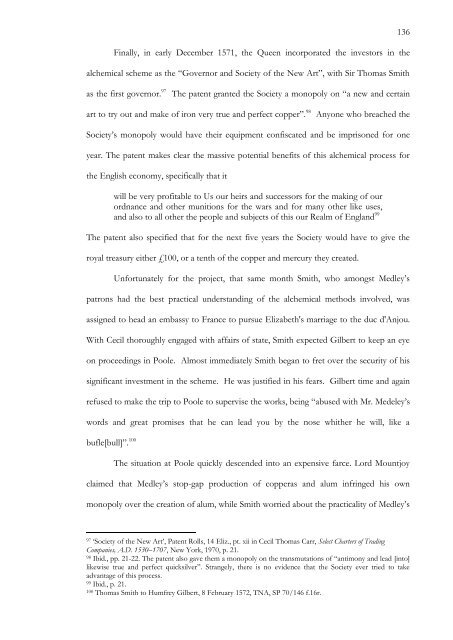The Alchemical Patronage of Sir William Cecil, Lord Burghley
The Alchemical Patronage of Sir William Cecil, Lord Burghley
The Alchemical Patronage of Sir William Cecil, Lord Burghley
You also want an ePaper? Increase the reach of your titles
YUMPU automatically turns print PDFs into web optimized ePapers that Google loves.
Finally, in early December 1571, the Queen incorporated the investors in the<br />
alchemical scheme as the ―Governor and Society <strong>of</strong> the New Art‖, with <strong>Sir</strong> Thomas Smith<br />
as the first governor. 97 <strong>The</strong> patent granted the Society a monopoly on ―a new and certain<br />
art to try out and make <strong>of</strong> iron very true and perfect copper‖. 98 Anyone who breached the<br />
Society‘s monopoly would have their equipment confiscated and be imprisoned for one<br />
year. <strong>The</strong> patent makes clear the massive potential benefits <strong>of</strong> this alchemical process for<br />
the English economy, specifically that it<br />
will be very pr<strong>of</strong>itable to Us our heirs and successors for the making <strong>of</strong> our<br />
ordnance and other munitions for the wars and for many other like uses,<br />
and also to all other the people and subjects <strong>of</strong> this our Realm <strong>of</strong> England 99<br />
<strong>The</strong> patent also specified that for the next five years the Society would have to give the<br />
royal treasury either £100, or a tenth <strong>of</strong> the copper and mercury they created.<br />
Unfortunately for the project, that same month Smith, who amongst Medley‘s<br />
patrons had the best practical understanding <strong>of</strong> the alchemical methods involved, was<br />
assigned to head an embassy to France to pursue Elizabeth's marriage to the duc d'Anjou.<br />
With <strong>Cecil</strong> thoroughly engaged with affairs <strong>of</strong> state, Smith expected Gilbert to keep an eye<br />
on proceedings in Poole. Almost immediately Smith began to fret over the security <strong>of</strong> his<br />
significant investment in the scheme. He was justified in his fears. Gilbert time and again<br />
refused to make the trip to Poole to supervise the works, being ―abused with Mr. Medeley‘s<br />
words and great promises that he can lead you by the nose whither he will, like a<br />
bufle[bull]‖. 100<br />
<strong>The</strong> situation at Poole quickly descended into an expensive farce. <strong>Lord</strong> Mountjoy<br />
claimed that Medley‘s stop-gap production <strong>of</strong> copperas and alum infringed his own<br />
monopoly over the creation <strong>of</strong> alum, while Smith worried about the practicality <strong>of</strong> Medley‘s<br />
97 ‗Society <strong>of</strong> the New Art‘, Patent Rolls, 14 Eliz., pt. xii in <strong>Cecil</strong> Thomas Carr, Select Charters <strong>of</strong> Trading<br />
Companies, A.D. 1530–1707, New York, 1970, p. 21.<br />
98 Ibid., pp. 21-22. <strong>The</strong> patent also gave them a monopoly on the transmutations <strong>of</strong> ―antimony and lead [into]<br />
likewise true and perfect quicksilver‖. Strangely, there is no evidence that the Society ever tried to take<br />
advantage <strong>of</strong> this process.<br />
99 Ibid., p. 21.<br />
100 Thomas Smith to Humfrey Gilbert, 8 February 1572, TNA, SP 70/146 f.16r.<br />
136















